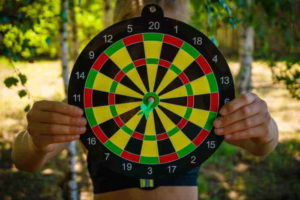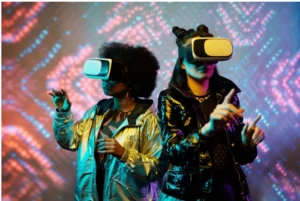Transformation of Entertainment: A Nostalgic Dive
Let us take a nostalgic journey back to simpler times. Picture this: families cozying up in their living rooms, huddling together around a single radio set, hanging on to every word of the evening’s broadcast.
Or perhaps, envisage the weekend ritual of walking into the local video rental store, skimming through aisles upon aisles of VHS tapes, and carefully selecting a film for the night.
As romantic as these memories seem, the evolution of technology has undeniably reshaped the very essence of how we consume entertainment.

From Physical to Digital – A Rapid Shift
Remember the tactile satisfaction of flipping over a cassette tape, or the sheer thrill of unwrapping a freshly-bought DVD? These now-relics were once staples of our entertainment diets. But, just as leaves fall and seasons change, the realm of entertainment experienced its rebirth. Physical mediums, although cherished, started receding into the shadows, making way for a brighter, digital dawn.
Digitalization, rather like an unstoppable tide, began its takeover. Cassette tapes made way for MP3s. DVD stores evolved into streaming platforms. And those age-old board games? They’ve found new life and intrigue in the vast world of online gaming. The tangible relics of yesteryears, laden with memories, took on new digital avatars, ensuring their legacy lived on in the ether of the internet. As the analog faded, a realm of boundless digital potential rose, redefining our conceptions of leisure and interaction.
Streaming Services – The New TV
Traditional cable television, with its strict schedules and often-limited choices, found itself grappling with the fresh-faced contenders in town: Netflix, Hulu, and Amazon Prime, to name just a few. These streaming titans heralded unparalleled convenience. Viewers now had the privilege to dive into a diverse sea of content, accessible at any time, from anywhere. One could hop from an obscure Japanese anime to an Oscar-winning documentary in a matter of seconds. What’s more, these platforms had an uncanny knack for understanding viewers’ tastes, curating bespoke recommendations that often hit just the right spot.
Moreover, the economic model of these streaming giants presented a dramatic shift from traditional TV subscriptions. Gone were the days of exorbitant cable bills with countless channels, many of which went unwatched. Instead, a relatively modest monthly fee opened the doors to vast libraries of content, from gripping dramas to enlightening docuseries. The power of choice was firmly in the hands of the viewer, fostering a sense of agency and customization. The days of ads disrupting a suspenseful scene were dwindling, replaced by uninterrupted viewing experiences. These shifts not only altered the way we consumed content but also transformed the very fabric of the entertainment industry, bringing in an era where content truly was king.
Online Gaming – A Whole New World
Just take a look at the electrifying domain of online gaming. Multiplayer extravaganzas that virtually transported players into fantastical realms, letting them forge alliances, conquer worlds, and embark on epic quests. And in this sprawling digital landscape, platforms like the 32Red casino UK online emerged, seamlessly blending the nostalgic allure of classic casino games with innovative, immersive experiences. Gaming was no longer just a pastime—it was an event, a global congregation of enthusiasts, all unified by their shared passion.
Diving deeper into the vast universe of online gaming, one can’t overlook the phenomenal rise of titles like “Fortnite,” “League of Legends,” and “Minecraft.” These games, transcending mere digital pastimes, evolved into cultural phenomena. The vibrant worlds they presented weren’t just battlegrounds or construction sites; they were arenas for music concerts, global competitions, and even educational sessions. Gamers from different walks of life, speaking varied languages, found common ground in these digital realms.
Take “Minecraft” for instance: while its blocky graphics might seem simplistic, the game has become a canvas for creativity, with players building everything from intricate replicas of famous landmarks to functioning computers within its universe. Similarly, “Fortnite” took the world by storm, not just for its engaging battle royale mode, but also for hosting virtual concerts with global superstars, blurring the lines between gaming and mainstream entertainment. These are testimonies to the boundless potential and expansive reach of online gaming in today’s age.
Enhanced Engagement with AR and VR:
Augmented Reality and Virtual Reality burst onto the scene, challenging our very perceptions of entertainment. No longer were you just a passive observer. With a VR headset, you could be front and center at your favorite band’s concert, or trekking through the enchanted forests of a fantasy game. AR, with its overlays on the real world, brought art, history, and even shopping to life in ways previously relegated to the domain of science fiction.
Imagine, attending a virtual concert where every note feels tangible, or being transported to the cobbled streets of Victorian-era London in a game. The boundaries between the digital and physical worlds have never seemed so wonderfully blurred.
Indeed, AR and VR are revolutionizing more than just the gaming or entertainment industries. Think about education and training. Medical students can now conduct virtual surgeries, honing their skills without the immediate risks involved in real-life operations. Architects and designers visualize structures and spaces in full 3D before they’re physically built, ensuring optimal design and utility.
Moreover, tourism and exploration are taking on a new dimension. Can’t travel to the Louvre? Strap on a VR headset and walk its hallowed halls from the comfort of your living room, examining the Mona Lisa without the crowd. AR applications can transform mundane city tours into historically rich experiences, overlaying ancient events or figures onto current landscapes, making the past come alive in the present.
Social Media – Changing the Face of Entertainment:
Social media platforms—TikTok, Instagram, YouTube—have revolutionized entertainment’s DNA. The power dynamics shifted. No longer were audiences merely passive consumers. With a smartphone in hand, anyone could wear the director’s hat, creating bite-sized skits, soulful music covers, or in-depth tutorials. The line between celebrity and everyday individual began to fade. Authenticity became the order of the day. Virality, the new fame. The world, truly, was at one’s fingertips.
Furthermore, the definition of ‘’community’’ has undergone a profound transformation with the rise of social media. Platforms like Twitter have become global town squares where discussions on politics, social issues, and pop culture converge in real-time. Users from distinct geographical locales unite under common hashtags, advocating for global movements or simply celebrating shared interests.
The appeal of platforms like Instagram transcends just photo-sharing. It’s evolved into a space where businesses flourish, artists showcase portfolios, and chefs unveil their culinary masterpieces. There’s a palpable democratization of content, where a home chef’s recipe could garner as much adulation as that of a Michelin-starred professional.
Meanwhile, YouTube has birthed an entirely new class of celebrities: the YouTubers. They’re filmmakers, educators, comedians, and reviewers who’ve built vast empires, often starting with nothing more than a webcam and a unique perspective. Platforms such as these have erased traditional barriers to entry in the entertainment industry, illustrating that with passion and authenticity, anyone can carve a niche in the digital age.
Traversing this timeline of entertainment’s evolution is nothing short of awe-inspiring. We’ve transitioned from gathering around radios to curating our own digital entertainment universes. The tools have changed, the medium has evolved, but the heart of it all—the human yearning for stories, experiences, and connections—remains as potent as ever.





